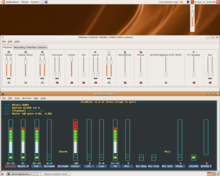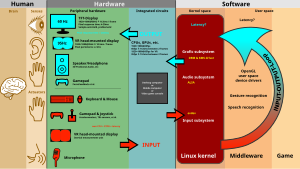 Screenshot of Alsamixer 1.0.14 | |
| Original author(s) | Jaroslav Kysela[1] |
|---|---|
| Developer(s) | ALSA team[2] |
| Initial release | 1998 |
| Stable release | 1.2.12[3]
/ 10 June 2024 |
| Written in | C[4] |
| Operating system | Linux |
| Type | |
| License | |
| Website | alsa-project |


Advanced Linux Sound Architecture (ALSA) is a software framework and part of the Linux kernel that provides an application programming interface (API) for sound card device drivers.
Some of the goals of the ALSA project at its inception were automatic configuration of sound-card hardware and graceful handling of multiple sound devices in a system. ALSA is released under GPL-2.0-or-later and LGPL-2.1-or-later.[5]
On Linux, sound servers, like sndio, PulseAudio, JACK (low-latency professional-grade audio editing and mixing) and PipeWire, and higher-level APIs (e.g OpenAL, SDL audio, etc.) work on top of ALSA and its sound card device drivers. ALSA succeeded the older Linux port of the Open Sound System (OSS).
- ^ "Jaroslav Kysela - Perex soft".
- ^ Alsa Team, alsa-project.org, 2008-09-29, retrieved 2012-01-08
- ^ "Main Page News - AlsaProject". 10 June 2024. Retrieved 11 June 2024.
- ^ "ALSA", Analysis Summary, Ohloh, archived from the original on 2013-12-20, retrieved 2012-01-08
- ^ a b "Introduction". alsa-project.org. Retrieved 2012-01-08.